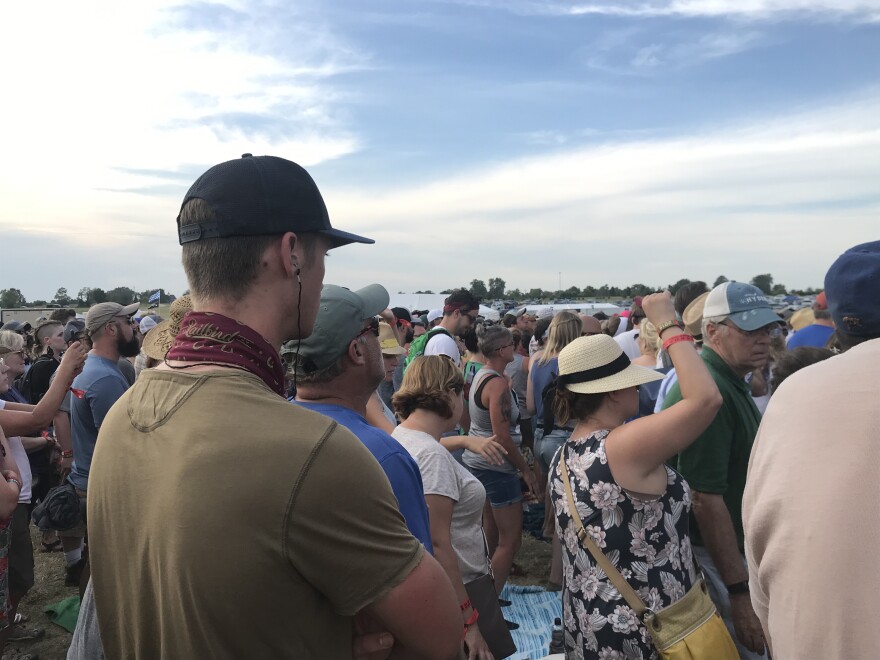There’s Gary Clark Jr., belting out his cover of The Beatles "Come Together." There’s a field full of throngs of people — moving to the jazz and blues rendition. There’s the electric guitar, the heavy drums. It’s a great setting for live music. It’s also the perfect setting for hearing damage.
Chances are that Clark’s music — along with much of the other music at Lexington’s Railbird music festival last weekend — was well over 85 decibels. This is the level where our ears can start losing cells, leading to both short-term and potential long-term hearing loss.
Shelley Childress knows all about hearing damage — that’s why she wore earplugs for most of the three-day festival. Now 45, she once played in two bands and said she wasn’t taking any chances at Railbird.
“People don't realize how and what it does to their hearing, and how it affects the little things going on inside of their ears,” Childress said.
The day before, she forgot the plugs.
“I completely forgot, and I've felt the effects,” she said.
In about a month, country musicians Tim McGraw and Keith Urban will be in Louisville to play the music festival Hometown Rising. A week later, the festival grounds will host Robert Plant and the Flaming Lips for Bourbon and Beyond. And the following week, Louisville will host the aptly-named Louder Than Life. Festivals like these are a special concern for audiologists like Casey Rutledge Roof who works at U of L Physicians.
“This is actually a huge topic of conversation in the audiology community, because this is the only hearing loss that's 100 percent preventable,” Rutledge Roof said. “If you know that you're going to a concert, you could have a pocket full of earplugs. That would save you some future trouble down the road.”
Hearing loss, she said, doesn’t just mean noise gets harder to hear. It’s also losing the ability to hear subtle sounds that make up words. Studies have shown people for the most part don’t know the danger they’re in.
“Over time, you're missing some of those subtle speech cues, especially the ‘F’, the ‘S,’ the ‘TH,’ some of those sounds that really help us separate one word from another and help make sense of words,” Rutledge Roof said.
Rutledge Roof says earplugs can reduce the overall volume of sound, thus reducing harm. She said to check the back of an earplug package; there will usually be a number listed, which indicates how much noise the plug will cancel out. If a concert goer is right in front of a stage, they could be exposed to noise up to 115 decibels. Earplugs could cancel out 22 of those decibels; the resulting 93 decibels is still over the healthy range, but reduces the harm.
Lauren Kilibarda, a 24-year-old from Lexington, didn’t wear earplugs at Railbird. She has worn earplugs at festivals that featured electronic dance music, which typically has high frequency notes. But she thought Railbird’s genre of music — more low-key bluegrass, blues and jazz - didn’t warrant extra protection.
“This type of music I didn't think would be as damaging, but I guess I don't know soundwaves that well,” Kilibarda said.
But Rutledge Roof says it doesn’t really matter what kind of music you’re listening to: a decibel is a decibel — no matter if it’s heavy metal or jazz.
She said the biggest act of prevention at concerts is choosing where you stand — the closer to the stage, the louder the decibel, and the less an earplug will help you. Kilibarda at Railbird said she stood far from the stage for most acts. But for Hozier, she was waiting for the band right up front.
“I haven't once thought, ‘Wow, it's been super loud.’ But I also haven't been very close — maybe after Hozier I'll know,” Kilibarda said.
Ultimately, Rutledge Roof said festivals and venues could do a better job of both educating concert goers about the risks of standing close to the stage and promoting earplug use.
Hearing loss loss is a public health issue — one that ends up costing the health care system billions in hearing aids and other devices.
“The research suggests there's not a huge uptake in earplugs,” Rutledge Root said. “And it's really mainly because they're not always convenient, and they're not always readily available.”
A spokesperson for concert promoter Danny Wimmer Presents said earplugs will be available at September's three Louisville music festivals — both for sale in the general store, and for free at the information booth.









